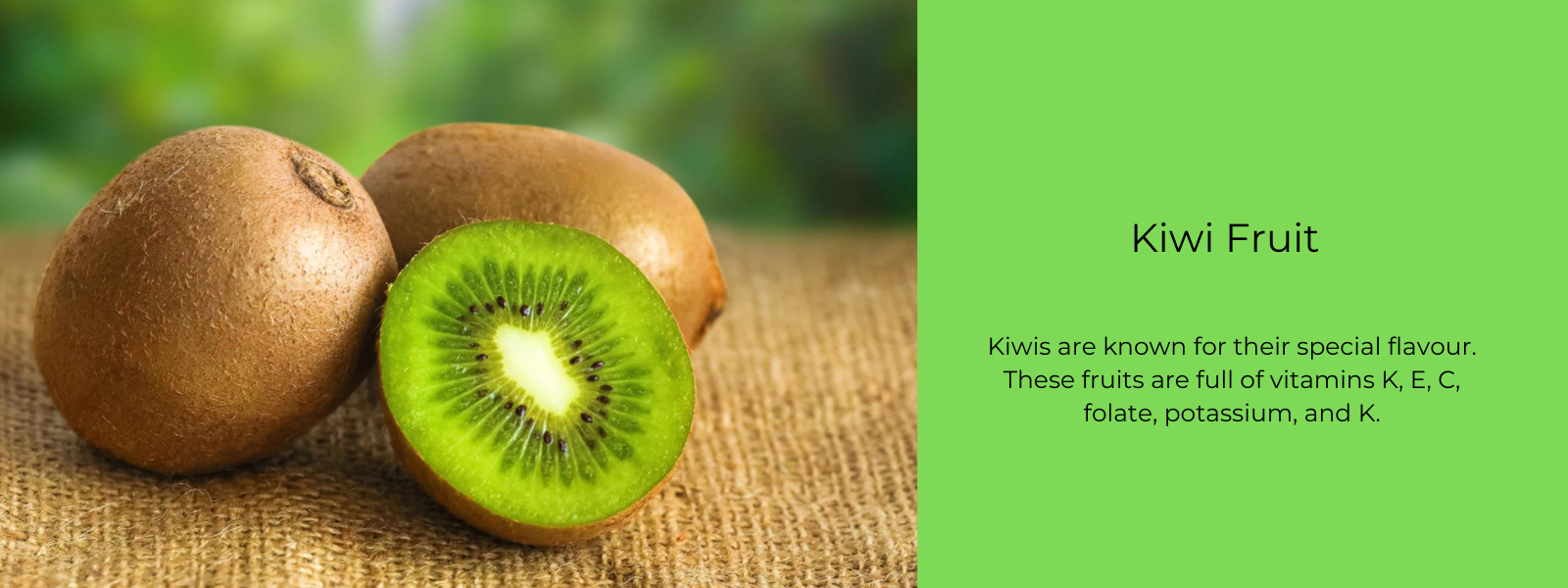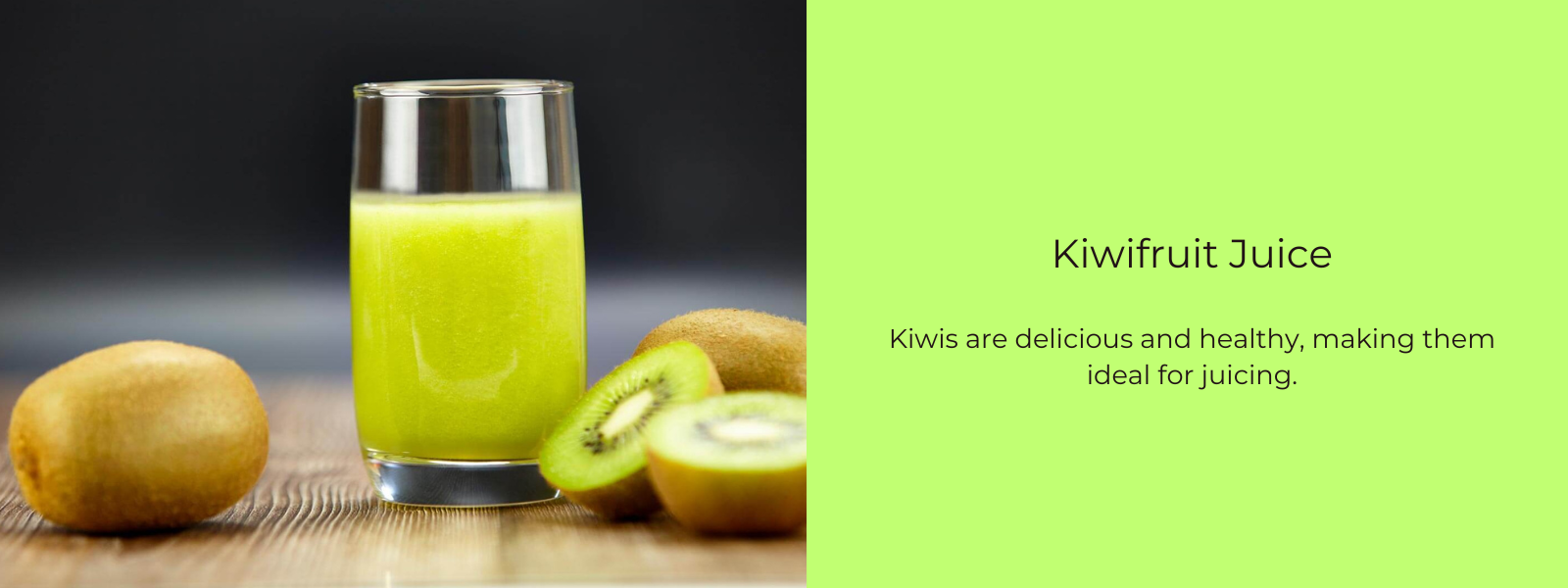Kiwi, the delectable green fruit, offers a sweet solution for digestive health with its unique digestive enzymes. Packed with the enzyme actinidin, kiwi facilitates the breakdown of dietary proteins, potentially reducing bloating and aiding in smoother digestion. Its natural laxative effect, attributed to a rich fiber content, promotes regular bowel movements and alleviates digestive discomfort. Kiwi's role as a prebiotic supports a healthy gut microbiome, while its antioxidant-rich profile contributes to gut health by combating oxidative stress. Convenient to snack on or incorporate into meals, kiwi also provides hydration support due to its high water content. With potential anti-inflammatory effects and the ability to enhance nutrient absorption, kiwi emerges not only as a delicious treat but as a sweet solution for maintaining gut wellness.
Table of Contents
What Is Kiwi?
Kiwi, also known as kiwifruit or Chinese gooseberry, is a small, brown, fuzzy-skinned fruit with vibrant green flesh and tiny, edible black seeds. Here are some details about kiwi and its uses:
- Nutritional Profile:
- Kiwi is rich in vitamin C, vitamin K, vitamin E, potassium, and dietary fiber. It also contains antioxidants, including flavonoids and carotenoids.
- Digestive Enzymes:
- Kiwi contains the enzyme actinidin, which aids in the digestion of proteins, potentially reducing bloating and discomfort.
- Fiber Content:
- The fruit is a good source of both soluble and insoluble fiber, supporting digestive health and promoting regular bowel movements.
- Hydration:
- With a high water content, kiwi contributes to hydration, which is essential for overall health and proper digestive function.
- Prebiotic Properties:
- Kiwi's fiber acts as a prebiotic, promoting the growth of beneficial gut bacteria and supporting a healthy gut microbiome.
- Antioxidant Benefits:
- The antioxidants in kiwi, including vitamin C, help combat oxidative stress, potentially reducing inflammation and supporting overall well-being.
- Versatility in Culinary Use:
- Kiwi can be enjoyed in various ways, such as:
- Fresh: Simply cut and eat the fruit on its own.
- Smoothies: Blend kiwi with other fruits for a refreshing smoothie.
- Salads: Add sliced kiwi to fruit salads or green salads for a burst of flavor.
- Salsas: Incorporate diced kiwi into salsas for a unique twist.
- Snacking:
- Kiwi is a convenient and portable snack, making it easy to include in a balanced diet.
- Desserts:
- Kiwi can be used in desserts like fruit tarts, sorbets, or as a topping for yogurt or ice cream.
- Garnish:
- The vibrant green color and unique texture of kiwi make it an attractive garnish for various dishes and beverages.
- Health Benefits:
- Regular consumption of kiwi may contribute to cardiovascular health, immune system support, and improved digestion.
Kiwi For Digestive Wellness:
Kiwi, the small but mighty fruit, is not only a delicious addition to your diet but also offers digestive benefits, thanks to its digestive enzymes. Here's a closer look at how kiwi's digestive enzymes can provide a sweet solution for gut troubles:
- Enzyme Actinidin:
- Kiwi contains a unique enzyme called actinidin, which is a protease. This enzyme assists in the breakdown of proteins in the digestive system, aiding in the digestion of dietary proteins and potentially reducing the risk of bloating and discomfort.
- Natural Laxative Effect:
- Kiwi is rich in dietary fiber, including both soluble and insoluble fibers. These fibers, combined with the enzyme actinidin, contribute to the fruit's natural laxative effect, promoting regular bowel movements and preventing constipation.
- Alleviates Digestive Discomfort:
- The combination of enzymes and fiber in kiwi can help alleviate digestive discomfort. It may be particularly beneficial for individuals experiencing issues such as indigestion or a feeling of heaviness after meals.
- Supports Microbiome Health:
- Kiwi's fiber content also serves as a prebiotic, promoting the growth and activity of beneficial gut bacteria. A healthy gut microbiome is essential for overall digestive health and immune function.
- Rich in Antioxidants:
- Kiwi is a rich source of antioxidants, including vitamin C and other phytochemicals. Antioxidants help combat oxidative stress in the digestive tract, potentially reducing inflammation and supporting overall gut health.
- Enhances Nutrient Absorption:
- The digestive enzymes in kiwi may contribute to better nutrient absorption, ensuring that the body effectively utilizes the essential nutrients from the food consumed.
- Snacking or as a Meal Addition:
- Kiwi is a convenient and versatile fruit that can be enjoyed on its own as a healthy snack or added to meals, salads, or smoothies to enhance both flavor and digestive benefits.
- Hydration Support:
- Kiwi has a high water content, contributing to hydration, which is crucial for maintaining proper digestion. Well-hydrated digestive systems function more efficiently.
- Easy to Include in the Diet:
- Kiwi is easy to incorporate into a variety of dishes. Whether sliced and eaten on its own, added to yogurt, or blended into a smoothie, kiwi provides a delicious and digestive-friendly option.
Ways to Include Kiwi Into Diet:
Incorporating kiwi into your diet can be particularly beneficial for digestion due to its unique digestive enzymes and high fiber content. Here are some ways to include kiwi for digestive health:
- Fresh Snacking:
- Enjoy kiwi on its own as a quick and convenient snack. Simply peel and slice the fruit for a refreshing treat.
- Fruit Salad Boost:
- Add kiwi slices to your fruit salad. The combination of fiber and enzymes can enhance the overall digestive benefits of the salad.
- Digestive Smoothies:
- Blend kiwi into your favorite smoothies. Combine it with other digestion-friendly fruits like pineapple and papaya for a delicious digestive boost.
- Kiwi Parfait:
- Layer kiwi slices with probiotic-rich yogurt and granola to create a parfait. The combination of fiber and probiotics can support gut health.
- Kiwi Chia Pudding:
- Mix kiwi puree or slices into chia pudding. The chia seeds provide additional fiber and omega-3 fatty acids, promoting digestive well-being.
- Green Salad Addition:
- Include kiwi in green salads to complement the leafy greens. The fiber content supports regular bowel movements.
- Kiwi Salsa for Digestive Chicken:
- Create a kiwi salsa with diced kiwi, tomatoes, cilantro, and lime juice. Use it as a topping for grilled chicken, providing a tasty and digestive-friendly option.
- Kiwi Oatmeal Topping:
- Sprinkle kiwi slices on top of your morning oatmeal or cereal. The fiber in kiwi can aid in maintaining digestive regularity.
- Kiwi and Greek Yogurt Snack:
- Pair kiwi slices with probiotic-rich Greek yogurt for a snack that promotes a healthy balance of gut bacteria.
- Kiwi Hydration:
- Enjoy kiwi's hydrating properties by adding it to infused water or as a topping for water-rich foods like cucumber.
- Kiwi and Mint Infusion:
- Infuse water with kiwi slices and mint leaves. This refreshing drink can support hydration and digestion.
- Kiwi Popsicles:
- Make digestive-friendly popsicles by blending kiwi with other fruits and freezing the mixture. The cold temperature can be soothing for the digestive system.
- Kiwi Sorbet Treat:
- Create a kiwi sorbet by blending frozen kiwi with a touch of honey. This natural dessert option can be gentle on the digestive system.










Leave a comment